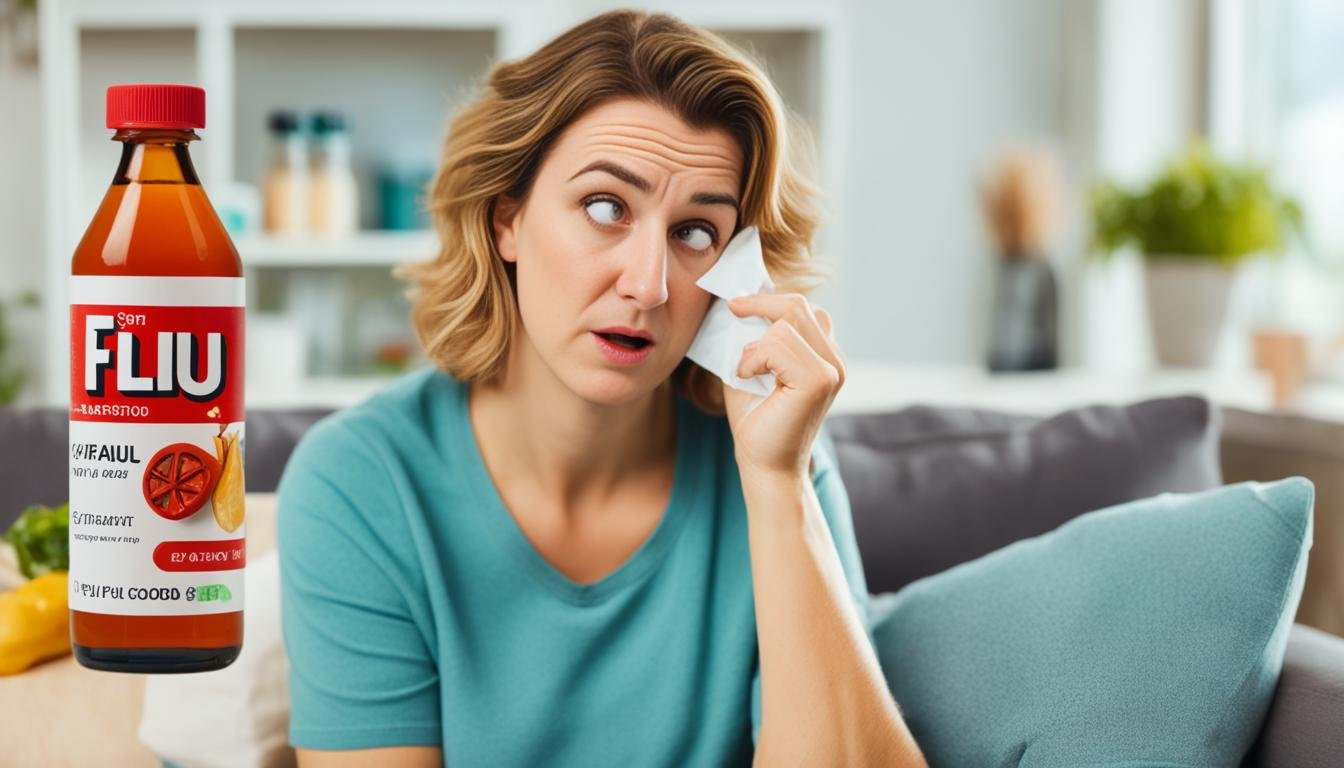Getting a flu shot is crucial for staying safe and keeping others protected from the flu. After you get the shot, it’s smart to avoid some things. This will make your recovery easier and help the vaccine work better. We’ll talk about things like hard exercise, drinking alcohol, and not looking out for side effects.1 Knowing what to do after your flu shot helps manage any slight reactions and boosts your immune system’s response.
Key Takeaways
- Avoid strenuous exercise, excessive alcohol consumption, and new medications after receiving a flu shot.
- Mild side effects like soreness, fever, and fatigue are common but typically resolve within 1-2 days.
- Serious reactions like high fever, severe allergic responses, and Guillain-Barré Syndrome (GBS) require immediate medical attention.
- Consult a healthcare provider if experiencing any unusual symptoms following the influenza vaccine.
- Rest, hydration, and over-the-counter pain relievers can help manage mild post-vaccine side effects.
Introduction to Flu Shots and Post-Vaccination Care
The flu shot is very important for stopping the flu and its bad effects. It does this by introducing the body to versions of the flu virus that can’t make you sick. This helps your immune system build up defenses.2 Remember, getting the flu shot won’t give you the flu. But, you might face some side effects. Knowing what to do after the shot is crucial.
Understanding the Flu Vaccine
The flu vaccine primes your immune system. It does so by introducing harmless forms of the virus to your body. These forms aren’t able to cause the flu. Still, they help your body make antibodies. These are proteins that can fight the flu virus if you come across it. This process lowers your chances of getting very sick from the flu.
Importance of Post-Flu Shot Precautions and Aftercare
After a flu shot, you need to watch out for possible side effects. It’s critical to take care during this time. Proper care after the flu shot is important. It not only helps you feel better but also keeps the vaccine working its best.3 Knowing how to take care and following tips can make your recovery easier. It can also boost the flu shot’s protective powers.
Common Side Effects and How to Manage Them
After getting a flu shot, you might feel sore at the spot where you got the shot. It could also be red, warm, or a little swollen. This happens because your body is gearing up to fight the flu.2
Body Aches and Pains
You might get body aches and feel a bit of pain after your flu shot. It’s because your immune system is busy making antibodies. Taking pain relief and resting can help soothe these symptoms.2
Dizziness or Fainting
Sometimes, people feel dizzy or even faint after the flu shot. This is usually because their blood pressure drops for a bit. Sitting or lying down for a few minutes after the shot can stop this from happening. It’s not very alarming.2
Mild Fever
Getting a small fever after the flu shot is also possible. It means your body is reacting to the vaccine. This fever should go away in a day or two. If it makes you feel bad, you can use fever reducers and rest to feel better.2
Serious Side Effects Requiring Medical Attention
A mild fever after a flu shot is common. But, a high fever (above 101°F) for several days is not. It might mean you need medical help.4 Be sure to call your doctor if you get a high fever after the vaccine.
Severe Allergic Reactions
Getting a bad allergic reaction to the flu shot is rare. Symptoms may include hives, difficulty breathing, fast heartbeat, dizziness, and feeling weak.4 If you feel any of these after your vaccine, get medical help right away. It could be anaphylaxis, a very serious condition.
Guillain-Barré Syndrome (GBS)
GBS is a rare disorder linked to the flu shot in a few cases. It can lead to muscle weakness or even paralysis.4 Tell your doctor if you experience strange muscle changes or feelings after the shot. They need to check these out and offer any needed treatment.

Medications and Supplements to Avoid After Flu Shot
It’s usually fine to keep taking your meds as usual after your flu shot. But, steer clear of new drugs or supplements until you talk to your doctor. Some medications, like immune system or virus fighters, might mess with how well the vaccine works.5 Also, some vitamin pills could cause problems.5 Make sure to chat with your doctor before making any changes. This way, you’ll stay safe and get the most out of your flu vaccine.
what to avoid after flu shot
Strenuous Exercise
After getting the flu shot, stick to moderate exercise. Avoid intense workouts for the first 24-48 hours.1 This step helps to prevent making any mild side effects worse. Also, choose gentle activities like walking or light yoga. These are good for your immune system and won’t push your body too much.
Alcohol Consumption
It’s best to stay away from too much alcohol after your flu shot. Drinking heavily can make the vaccine less effective.1 There’s no issue with a small amount. But, limiting or stopping alcohol for a short time is a good idea for the vaccine to work at its best.
Ignoring Potential Side Effects
Don’t shrug off any side effects from the flu shot.1 It’s normal to have some minor reactions. But, if you face a high fever or severe allergic reactions, seek medical help right away.36 Being watchful and dealing with any big issues fast will help you recover smoothly. This way, you won’t miss the full protection the flu shot offers.
Flu Shots During Pregnancy: Precautions and Considerations
Getting a flu shot while pregnant is very important. It helps protect both the mom and the baby.7 Pregnant women are more likely to have serious problems from the flu. The shot also gives the baby protection from birth.
Protecting Mother and Baby
Studies show flu shots are safe for pregnant women.78 Groups like CDC and WHO recommend them. They prevent severe flu problems in moms-to-be.
Safety Assurance
Doctors suggest pregnant women get a flu shot at any time. It boosts the immune system against flu all season long.7 It’s safe during all trimesters, helping to protect during pregnancy’s most critical times.
Timing and Administration
Worries about the flu shot and the baby’s safety are mostly unfounded.78 It’s safe for moms and babies. There’s no higher risk of problems. Always talk to your doctor before getting the flu shot.
Addressing Concerns
Worries about the flu shot and the baby’s safety are mostly unfounded.78 It’s safe for moms and babies. There’s no higher risk of problems. Always talk to your doctor before getting the flu shot.
Factors to Consider After Receiving the Flu Shot
Keep a close eye on your health after getting the flu shot.9 This is crucial, especially if you already have health issues or are on specific medications. You might need extra advice from your doctor.
Age
Your age affects how you might react to the flu shot. Know what to expect based on your age. It’s also important to understand self-care steps for after the shot.
Preexisting Conditions
Having certain health problems means you should talk to your doctor before the flu shot. They will help you understand what to expect and if the shot is right for you.
Personal Comfort and Preferences
Feeling good after the flu shot is key for a quick recovery. Rest, take care of yourself, and pay attention to your body. This will make the time after the shot easier.
Foods and Drinks: What to Avoid or Consume
After getting the flu shot, you don’t need to follow strict food rules. But, eating a balanced diet is smart. This helps your immune system. Stay away from too much processed or sweet foods. These can make your immune system weaker.10 Instead, eat fresh fruits, veggies, whole grains, and lean meats. Adding probiotic foods is good for you too. Drinking lots of water is key.
| Recommended Foods | Foods to Avoid |
|---|---|
|
|
Eating well and drinking enough water boosts your immune system post-flu shot. This supports a quick recovery.10
Aftercare and Recovery: Tips for a Smooth Experience
Rest and Hydration
After your flu shot, it’s important to get enough rest and drink lots of water. Try to sleep 7–8 hours every night. Also, make sure to drink plenty of water all day long. These steps will help your body recover well and focus on fighting off sickness.11
Over-the-Counter Pain Relievers
If you feel a little sore or achy after your flu shot, you can take over-the-counter pain meds. This includes acetaminophen or ibuprofen. Remember, it’s critical to follow the recommended dose. Taking too much could affect how well your body responds to the vaccine.11
Monitoring for Complications
It’s important to watch for any unusual or ongoing symptoms after getting the flu shot. Mild reactions, like a bit of soreness or low-grade fever, are normal. But, if you get a high fever or have a severe allergic reaction, seek medical help right away. Don’t wait to call your doctor if you’re worried about how you feel.312
Flu Vaccination: Protecting Yourself and Your Community
The flu shot works well to keep people safe from the flu’s bad effects. It helps lower the chance of getting sick badly and needing to go to the hospital.13
Individual Protection
When most people in a town get the flu shot, it helps shield everyone. This is great because it means those who can’t get the shot are also protected.13
Herd Immunity
Flu shots are very important for stopping the flu from spreading too much in an area. This keeps hospitals from getting too busy. It also makes sure sick people can get the care they need.13
Community Health
Getting a flu shot helps keep our work and schools running smoothly. It saves money by preventing big healthcare costs. It’s good for the economy by keeping people healthy.1314
Economic Impact
Some people need the flu shot more than others. Like older folks, young kids, and those with weak immune systems. It keeps them safer from getting very sick.14
Targeting Vulnerable Populations
It’s best to get your flu shot before October ends. That way, your body has time to make strong protection. You’ll be safe during the whole flu season.13
Seasonal Preparedness
By getting the flu shot and taking care, we help make our community stronger. This protects not just ourselves but also the people we care about.
Conclusion
Getting the flu shot helps you and others avoid getting seriously sick. It’s good to know what to expect, like a bit of soreness or a low fever, which usually go away in a day or two1. And though rare, there are some very serious side effects to watch out for, like severe allergic reactions or GBS1.
After your flu shot, make sure to rest and drink plenty of water. It’s wise to keep an eye on how you’re feeling, too. If anything seems off, don’t hesitate to contact your healthcare provider1. By doing these things, we help ensure our own and our family’s well-being.
The flu shot offers great protection. For the elderly, it cuts their chance of ending up in the hospital by 27% from flu or pneumonia3. And if you have chronic illnesses like diabetes or lung disease, it lessens the risk of your condition getting worse from the flu3. Not to mention, it decreases the chance of death for those hospitalized with the flu3. By making the flu shot a priority and taking good care after, we all make the community safer.
FAQ
What are the common side effects after getting a flu shot?
When should I seek medical attention after the flu shot?
Are there any medications or supplements I should avoid after getting the flu shot?
What physical activities should I avoid after receiving the flu shot?
Should I avoid alcohol after getting the flu shot?
Is the flu shot safe for pregnant women?
How can I support my recovery after getting the flu shot?
Why is it important to get the flu shot each year?
Source Links
- https://www.myvaccinelawyer.com/vaccine-injury-lawyer/resources/vaccine/flu/what-to-avoid
- https://www.cdc.gov/flu/prevent/flushot.htm
- https://pharmeasy.in/blog/caution-aftercare-what-to-avoid-after-receiving-your-flu-shot/
- https://www.vaccineinjuryteam.com/what-to-avoid-after-a-flu-shot/
- https://www.drugs.com/drug-interactions/influenza-virus-vaccine-inactivated.html
- https://hola.health/health-info/diet-lifestyle/what-to-avoid-after-flu-shot-prepping-and-aftercare-steps/
- https://www.cdc.gov/flu/highrisk/qa_vacpregnant.htm
- https://www.cdc.gov/flu/prevent/qa_vacpregnant.htm
- https://www.cdc.gov/flu/prevent/general.htm
- https://www.verywellhealth.com/what-to-avoid-after-flu-shot-7984249
- https://healthtipers.com/what-to-avoid-after-flu-shot/
- https://www.healthline.com/health/flu-shot-sore-arm
- https://www.renown.org/blog/protect-yourself-and-others-with-the-flu-shot
- https://www.cdc.gov/flu/vaccines-work/vaccineeffect.htm




